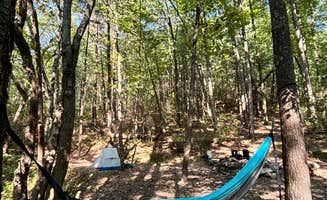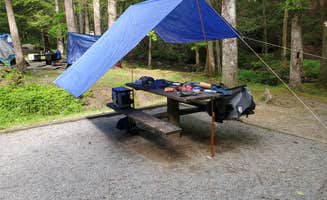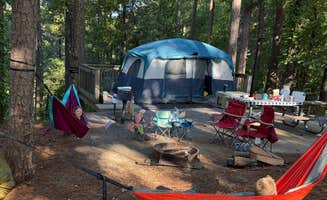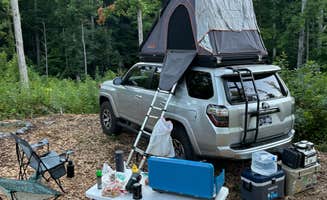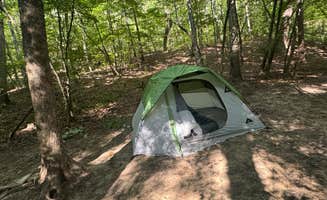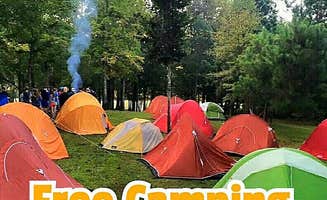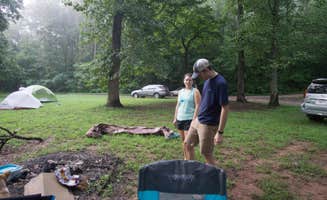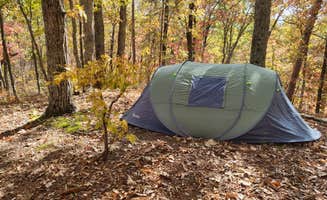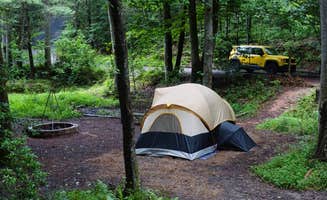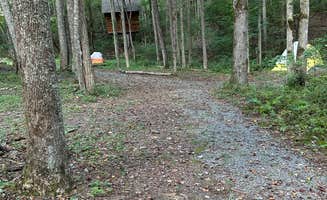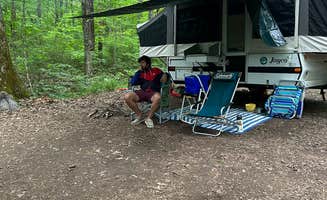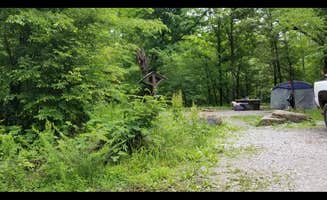Primitive tent camping near Chatsworth, Georgia offers access to the Cohutta Wilderness, Georgia's largest wilderness area at 36,977 acres. This mountainous region features elevations ranging from 900 to 4,200 feet and contains over 90 miles of maintained trails within dense hardwood forests. Winter nights regularly drop below freezing, while summer daytime temperatures typically reach the mid-80s with high humidity and frequent afternoon thunderstorms.
What to do
Trout fishing in mountain streams: Several campgrounds provide direct access to trout-filled waters. At Bear Creek Campground, the stream crossing near the parking area is "full of trout" according to visitors who've stayed multiple times arriving by "4x4 and duel sport motorcycles."
Waterfall hiking: Numerous cascades dot the region's trail systems. At Hickey Gap, campers report "a giant waterfall down the trail if you can make the trek" and mention that the area has "tons of great swimming areas" along the trail.
Backpacking multi-day routes: The wilderness area offers extensive trail networks for overnight trips. The Big Frog Area provides access to summit trails where campers note it's "one of the most beautiful places I've ever been" with opportunities to see it "when it was snowing and it was white and just absolutely gorgeous."
What campers like
Streamside camping spots: Many primitive sites feature creekside locations. Campers at Hidden Creek Campground describe the area as "very nice secluded and away from people" with multiple site options including some "down the mountain down the other trail that's not as bad and easier to get to."
Wildlife viewing opportunities: The wilderness hosts diverse animal species. One camper at Hickey Gap spotted "3 copper heads at the creek" while others regularly report bear activity throughout the region, noting the area has "bear boxes and signs clearly indicating there are bears around."
Sunset viewing locations: Strategic camping locations offer exceptional evening views. At Fort Mountain State Park Backcountry Campsites, site #4 is praised because "it's about 0.2 miles from a beautiful west facing overlook where I enjoyed the sunset."
What you should know
Road conditions: Many access routes require high-clearance vehicles. Hidden Creek Campground has "LOTS OF DEEP POTHOLES" with visitors warning that "a low car may not fair as well" on the entrance roads.
Bear safety protocols: Bear activity requires proper food storage throughout the region. At Long Creek Falls Appalachian Trail, visitors advise "if you drive in, keep your food in your car. If you hike in, store your food properly with a bear bag or canister."
Seasonal considerations: Weather greatly impacts camping conditions. One camper who visited Hickory Creek Trail Backcountry Campground recommends checking out the wilderness "in late fall or early spring" to avoid summer bugs while still enjoying the creekside camping experience.
Navigation challenges: GPS reliability varies within the wilderness. At Hidden Creek Campground, visitors note "GPS isn't perfect. It will take u to someone's private property next door. Look for the big wooden sign that indicates that it is for public use."
Tips for camping with families
Choose sites with flat tent areas: Not all wilderness sites accommodate family-sized tents. Woodring Branch Primitive Campground has "tent only camping" with "10 sites on the road" where "the kids could safely play in the road" according to families who've stayed there.
Scout reliable water sources: Mountain streams may be seasonal. Fort Mountain State Park Backcountry Campsites feature small creeks that flow through some sites for "easy water access" but visitors note they "don't flow all year."
Plan activities around wildlife watching: The diverse ecosystem offers educational opportunities. Bear Creek Campground features sites "under towering trees" where children can explore nearby areas with "sufficient dining and shopping options" about 20 minutes away in Ellijay for backup plans.
Tips from RVers
Assess clearance requirements: Forest service roads present challenges for larger vehicles. Bear Creek Campground requires a "stream crossing to reach" the camping area that "should only be attempted with a high clearance and possibly 4x4 vehicle."
Limited RV-suitable sites: Most primitive camping areas accommodate only smaller rigs. At Hickey Gap, one RV camper noted "the driveway to and from the camp area is quite steep" and their "2WD (front wheel drive) Honda Passport struggled to get back up it" requiring "some speed to make it out."
Consider separate day-use access: Some wilderness areas better serve as day trip destinations. One experienced visitor suggested that Bear Creek Campground "is not deep enough in to the wilderness to be considered a destination campground" but works well for "your first night on the road" when planning longer trips.


